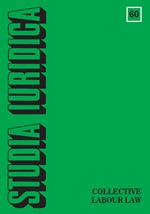Representation of Workers in Individual Cases – Current State of Affairs and Directions of Changes
Representation of Workers in Individual Cases – Current State of Affairs and Directions of Changes
Author(s): Alina Wypych-ŻywickaSubject(s): Law, Constitution, Jurisprudence
Published by: Wydawnictwa Uniwersytetu Warszawskiego
Keywords: representation of workers; individual employee matters; trade union; cooperation process; information-related procedure
Summary/Abstract: The paper is an analysis of the representation of workers in individual employee cases. The author shows the current model of cooperation of the employer and the trade union in individual employee matters and gives several suggestions as to how to change the current state of affairs. In the opinion of the author, it is reasonable to ask to what extent the postulate to completely change the model of cooperation is actually justified. In individual matters concerning employment relationship the trade unions represent the rights and interests of their members. Additionally, at the request of an employee who is not a member of the trade union, the trade union can undertake his or her defence. The employer’s decision to cooperate with the trade union in a specific case must be preceded by a determination of whether the trade union represents the employee. At this stage a few questions arise. The first one is whether the information-related procedure is part of the cooperation process or should be viewed as separate processes. The second is the question about sanctions for the information-related procedure not having been observed. However, the most important is the question about the form in which information is to be obtained – in the form of a list of employees or limited to a specific employee? After short presentation of the current state of affairs, the author considers two options as to the future model of representation of workers in individual employee matters. The first one is that the trade unions should leave the workplace, retaining their powers to protect employees in individual cases. And the second option assumes retaining trade unions at the workplace, with other entities also allowed to cooperate with the employer in individual employee matters.
Journal: Studia Iuridica
- Issue Year: 2015
- Issue No: 60
- Page Range: 283-294
- Page Count: 12

